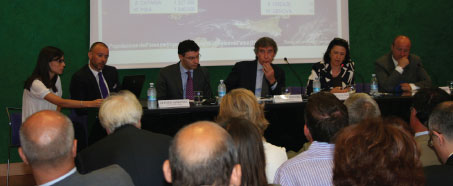Sponsored by Assaeroporti (the Italian airport association) and ENAC (the Italian Civil Aviation Authority), the workshop was attended by Giuseppe Bonomi, President and CEO, SEA Aeroporti di Milano; Olivier Jankovec, Director General, ACI EUROPE; and Stefano Paleari, Director of the Scientific Committee of ICCSAI (International Center for Competitiveness Studies in the Aviation Industry).
Aeroporto G Marconi di Bologna President Giuseppina Gualtieri opened the meeting with an analysis of the economic impact of Bologna Airport, which has a catchment area of 10.3 million. Local residents make an average of 5.4 trips per person per year, with 69% of those departing from Aeroporto G Marconi di Bologna. The airport handled 4.77 million passengers in 2009 – a 13.2% increase year-on-year, making it Italy’s eighth busiest airport. This growth was significantly above the European average, which saw a -5.4% decline in 2009. The latest available figures for June show that passenger traffic grew 13.4% to 510,000 – the first time the airport has exceeded half a million passengers in a single month. The summer 2010 timetable includes 15 national routes, 84 international and 4 intercontinental.

Pictured at the workshop are: Olivier Jankovec, Director General, ACI EUROPE; Stefano Paleari, Director of the Scientific Committee of ICCSAI; Giuseppe Bonomi, President and CEO, SEA Aeroporti di Milano; and Giuseppina Gualtieri, President, Aeroporto G Marconi di Bologna.
“When we talk about airports, we tend to refer to the number of passengers, the services and the business results. In actual fact, airports also have an increasingly important role as ‘engines for economic development’,” said Gualtieri.
141 different operators work at Aeroporto G Marconi di Bologna, including associations, airlines, service providers, shops and other retail business. The significance of the airport’s economic impact is borne out by the fact that these operators generate a total of 2,248 jobs and a production value of €297.7 million.
A further 1,000 jobs have been created as a result of indirect impact (business outside the airport but connected to it) and 1,750 jobs due to induced impact (generated by the multiplier effects of the other impacts), meaning around 5,000 jobs in total can be attributed to business in and around the airport. The economic impact is put at a substantial €550 million, which equates to 1.7% of GDP for the province and 0.4% of GDP for the region of Emilia Romagna – of which Bologna is the capital – as a whole.
“Figures for Bologna include: over a thousand jobs overall and €118 million generated for every million passengers. This means that the increase in passenger traffic in 2009, equivalent to over 500,000 additional passengers, produced an impact of creating around 500 jobs and generated an extra €60 million,” said Gualtieri.
Developing the region
The workshop also highlighted that airports can act as catalysts for local development. Aeroporto G Marconi di Bologna has been proactive in this sense. Gualtieri explained that the Industrial Plan approved in 2008 proposes to transform the airport into an ‘Airport City’, “with the aim of creating added value for shareholders and helping to further develop the local region”. “The efficient integration between an airport and an area of excellence can help to develop synergies and benefits to the local economy,” he said.
Aeroporto G Marconi di Bologna also took the opportunity to present its first Sustainability Report, which was prepared in conjunction with the financial statements already sent to shareholders. Internationally recognised methods have been used to report not only economic and financial results, but also company performance and decision-making processes from an integrated viewpoint and based on real examples of sustainable behaviour. This behaviour refers to the environment, quality of service, safety and human resources.
The workshop was effective in demonstrating the role of airports as engines of economic development. The data presented by Aeroporto G Marconi di Bologna is the result of work that began in 2009 with the aim of raising awareness of the benefits produced by the airport. This work is designed to bring the airport’s role in local economic development to the attention of stakeholders, while creating greater involvement and integration among the community and providing an important and effective tool for working in partnership with the local region towards shared development objectives.







